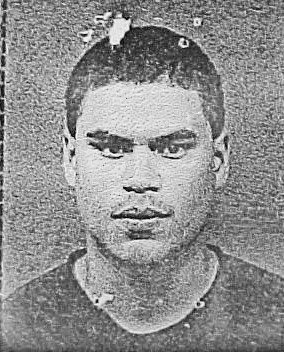Jose Padilla was arrested in Chicago on May 8, 2002, on charges of conspiring to detonate a "dirty" nuclear bomb somwhere in the United States. This photo is from an October 1991 arrest in Broward County, Fla. rlw/Broward County Sherriff's Dept. UPI. |
License Photo
ATLANTA, Sept. 19 (UPI) -- A federal appeals court in Atlanta Monday ordered a new sentencing for convicted U.S. terrorist Jose Padilla, suggesting 17 years was too light.
Padilla was arrested at Chicago's O'Hare International Airport in 2002, with Bush administration officials saying he was scouting U.S. locations for an attack with a "dirty bomb" -- a conventional explosive wrapped in radioactive material.
He was held in a military brig for more than three years as an "enemy combatant" until moved to a civil prison and charged in civilian court, but not with the "dirty bomb" allegation.
A federal jury in Miami indicted Padilla, Adham Hassoun and Kifah Jayyousi, along with Mohammed Youssef and Kassem Daher, on charges of providing material support to terrorists.
Youssef and Daher remain fugitives.
The three in custody were convicted in April 2007 of conspiracy to murder persons outside the United States and maiming persons outside the country.
Padilla was sentenced to 208 months, Hassoun to 188 months and Jayyousi to 152 months on one count and lesser imprisonment on other counts, to be served concurrently.
All three appealed, and the U.S. government appealed Padilla's sentence.
The appeals court panel ruled 2-1 Monday, "The record shows that the government presented evidence that the defendants formed a support cell linked to radical Islamists worldwide and conspired to send money, recruits and equipment overseas to groups that the defendants knew used violence in their efforts to establish Islamic states," ruling against all three.
On the government's cross-appeal, the majority said the sentencing judge "attached little weight to Padilla's extensive criminal history, gave no weight to his future dangerousness, compared him to criminals who were not similarly situated and gave unreasonable weight to the conditions of his pre-trial confinement.
"We have meticulously reviewed the entire record of the four-month trial in this case and conclude that the defendants are not entitled to relief on any of their claims."
U.S. Circuit Judge Rosemary Barkett dissented in part, saying Padilla's sentence should not be disturbed.
Both sides now can ask the full appeals court to rehear the case, or ask the U.S. Supreme Court for review.















